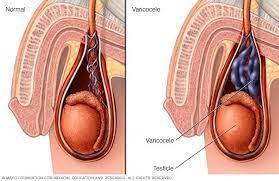Varicocele is a condition that occurs when the veins in the scrotum become enlarged and dilated. It is a common condition that affects approximately 10-15% of men and is most commonly diagnosed in young men between the ages of 15 and 25. While varicoceles can be a source of discomfort and embarrassment, they are usually not serious and can be easily treated.

What are the symptoms of a Varicocele?
Varicoceles can cause several symptoms, including:
- Pain and Discomfort Varicoceles can cause pain and discomfort in the scrotum, especially after standing or physical activity. The pain can range from a dull ache to a sharp pain.
- Swelling Varicoceles can cause swelling in the scrotum, which can be noticeable and uncomfortable.
- Fertility Problems Varicoceles can affect fertility by causing decreased sperm production and quality. This can lead to difficulty in conceiving and infertility.
- Testicular Atrophy In rare cases, varicoceles can cause testicular atrophy, which is a shrinking of the testicle. This can lead to a decrease in testosterone production and affect a man’s overall health.
What Causes a Varicocele?
The exact cause of varicoceles is not always clear, but it is thought to be related to the valves in the veins that help regulate blood flow. When these valves malfunction, blood can pool in the veins, causing them to become enlarged and twisted.
How are Varicoceles treated?
There are various treatment options for men with varicocele.
Observation
In some cases, varicoceles do not cause any symptoms or affect fertility, and treatment may not be necessary. Your doctor may recommend regular check-ups to monitor the condition and ensure that it does not worsen over time.
Surgery
Surgical treatment is often recommended for varicoceles that cause discomfort and pain or affect fertility. The most common surgical procedure for varicoceles is called a varicocelectomy, which involves tying off or removing the affected vein. This can be done through open surgery or minimally invasive techniques such as laparoscopy or percutaneous embolisation.
Embolisation
Embolisation is a minimally invasive procedure that involves injecting a material into the affected vein to block blood flow and prevent further enlargement. This procedure is typically performed by a radiologist and can be an effective alternative to surgery.
Pain Management
Over-the-counter pain medications such as ibuprofen or acetaminophen can help to manage pain and discomfort associated with varicoceles. Wearing supportive underwear and avoiding activities that worsen symptoms can also help to manage discomfort.
Conclusion:
While varicoceles can be uncomfortable and may affect fertility, they are usually not serious and can be easily treated. If you are experiencing symptoms of varicocele or have concerns about your fertility, it is important to talk to your GP. A urologist can perform a physical exam and recommend appropriate treatment based on your individual needs. By exploring your treatment options, you can find relief from the symptoms of varicocele and improve your overall health and well-being.
Author: Neil A Haldar MBBS MD FRCS
Consultant Urological Surgeon
The Pelvic Specialists
